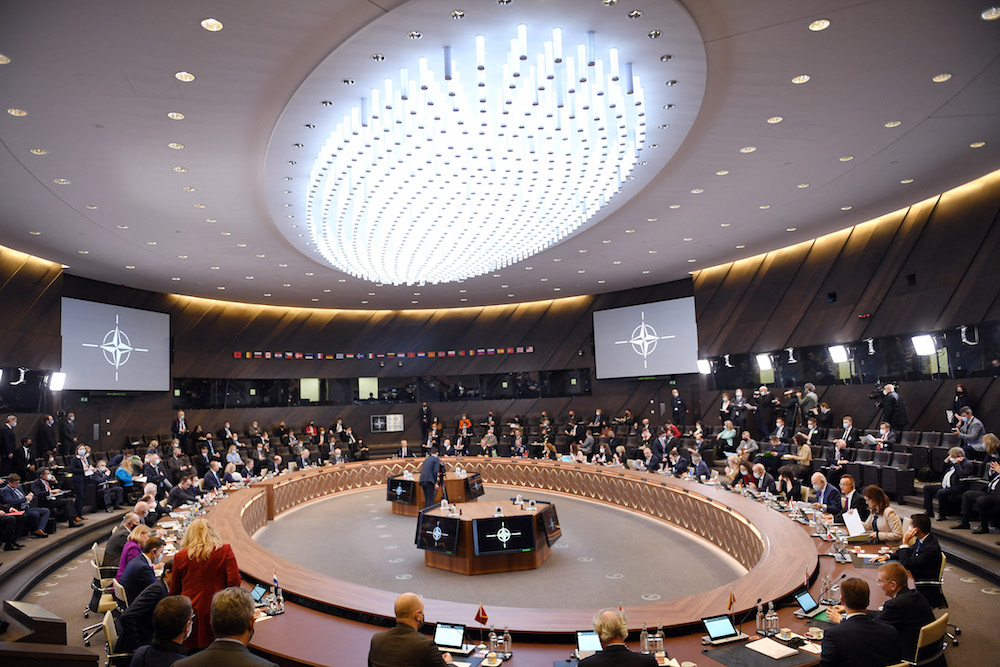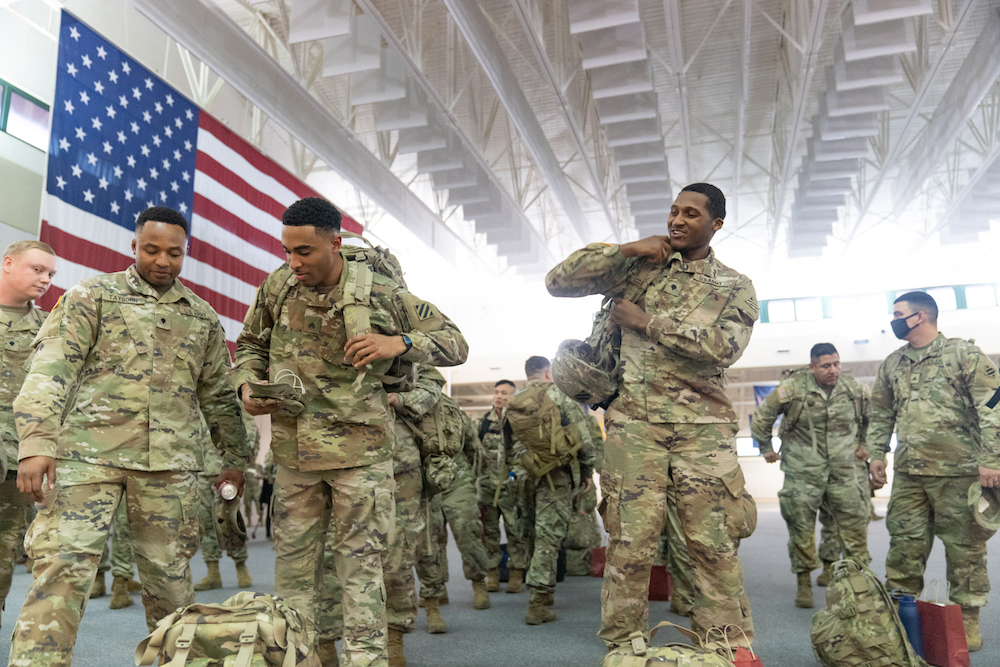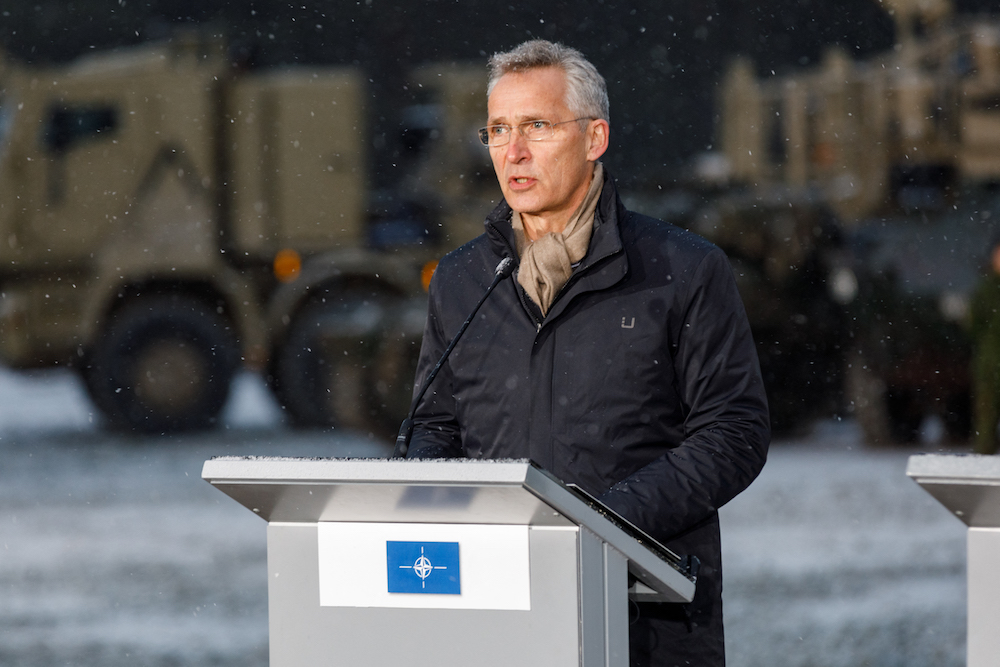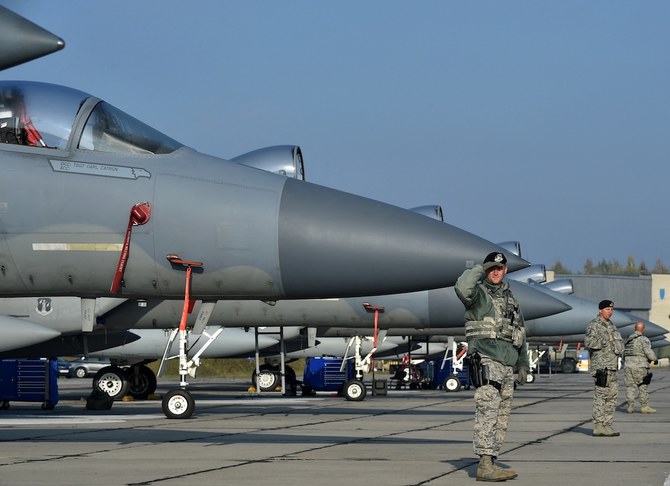WASHINGTON D.C.: Seventy-two years after its creation at the dawn of the Cold War, the North Atlantic Treaty Organization has experienced a rude reawakening, as Russia’s invasion of Ukraine threatens to drag member nations into a direct confrontation with Moscow.
For eight years, NATO had largely avoided becoming embroiled in Ukraine. It chided Russia for its annexation of Crimea in 2014 and support of pro-Russian separatists in Donbas and Luhansk, while doing little of consequence to shore up the position of its Eastern European allies.
Now that Russia’s intentions in Ukraine have become clear, Jens Stoltenberg, NATO’s secretary general, has undertaken a peripatetic schedule of meetings with world leaders to drive home the message of the military alliance’s unanimous support for Kyiv.
As Russian warplanes, rockets and artillery pounded Ukrainian cities, forcing more than 2 million people from their homes, Stoltenberg condemned what he described as Russian President Vladimir Putin’s aggression against a sovereign European state and promised a united response.

“President Putin’s war on Ukraine has shattered peace in Europe,” Stoltenberg said during a visit to a military base in Latvia, on NATO’s eastern frontier. “It has shaken the international order and it continues to take a devastating toll on the Ukrainian people.”
Moscow says its “special military operation” is aimed at protecting Russia’s security and that of Russian-speaking people in Ukraine’s eastern Donbas region.
Since the dissolution of the Warsaw Pact in 1991 heralded the end of the Cold War, NATO members have frequently quarreled over the precise role — even the necessity — of the alliance, which was built primarily to deter Soviet expansion in post-war Europe.
Now, Russia’s war in Ukraine, a prospective member of NATO and the EU, appears to have breathed new life into the alliance and the values that unite its members, giving it a renewed sense of purpose and resolve.
Victoria Coates, who was a deputy national security adviser to former President Donald Trump, believes the outcome of the war in Ukraine might well determine NATO’s long-term future and relevance.

Jens Stoltenberg, NATO’s secretary general, has undertaken a peripatetic schedule of meetings with world leaders to drive home the message of the military alliance’s unanimous support for Kyiv. (AFP)
“The future utility of NATO will be determined by the events of the next six months,” she told Arab News. “The alliance was severely stressed by the US surrender of Afghanistan to the Taliban without consulting NATO partners in that mission, and is being tested again by Putin’s invasion of Ukraine.
“If NATO can coordinate to provide security to civilians and impose multilateral economic sanctions in response to this crisis, it can be a model for other collaborative security networks led by the US around the globe, and new members such as Sweden and Finland should be welcomed.
“But if NATO cannot mount a serious response to Putin, the future of the alliance will be in serious doubt.”
Some analysts believe Putin might have underestimated NATO, perhaps expecting it to implode under the weight of disagreements and past follies. In reality, quite the opposite has happened: It has rallied its members around a common cause and kick-started the biggest mobilization of NATO troops since the 1999 Kosovo intervention.
During a visit to Europe just a week before the launch of the Russian assault, US Secretary of Defense Lloyd Austin warned Putin that his build-up of military forces along Ukraine’s border would only strengthen the NATO alliance.
“Mr. Putin says that he doesn’t want a strong NATO on his western flank,” Austin said at the alliance’s headquarters. “He’s getting exactly that.”

NATO foreign ministers gather for a meeting following Russia’s invasion of Ukraine, at the Alliance’s headquarters in Brussels on March 4, 2022. (AFP)
Whether by design or as a result of a miscalculation, Putin decided to call NATO’s bluff and launched the biggest military operation on the European continent since the Second World War.
In the early days of the invasion it was unclear how strongly key members of NATO would react to the threat to their Eastern European allies. Stoltenberg himself had stressed on multiple occasions that NATO was not seeking a direct confrontation with Russia, while France and Germany initially did not appear to be on the same emotional wavelength as the Baltic states, Poland and Romania.
As the days passed, however, any hopes Putin might have had in the Europeans quietly acquiescing were quickly dashed as nation after nation declared solidarity with Ukraine, imposed sanctions on Russia, and pledged to send military equipment and financial aid to the defenders of the country.
Even Finland, which shares Europe’s second-longest border with Russia, after Ukraine, and which has a history of fraught relations with Moscow, is carefully reassessing its neutrality. Its prime minister, Sanna Marin, has promised a thorough debate on whether joining NATO is in the national security interests of the country. Polling data suggests that in the wake of the Russian invasion of Ukraine, a majority of Finns would support becoming part of the alliance.
“The war in Ukraine has reinvigorated NATO,” Luke Coffey, a senior fellow at The Heritage Foundation, an American conservative think tank, told Arab News.
“After two decades of out-of-area operations in places like Afghanistan and Libya, the alliance likely got back to basics and focused primarily on territorial defense in the North Atlantic region.
“There is a growing realization that NATO doesn’t have to be everywhere doing everything but it must be able to defend Europe from Russian aggression. We should not forget that all of this comes at a time when NATO is drafting its next Strategic Concept, a document that will help guide the alliance’s strategic approach for the coming years.”

Members of The B Company 87th Division Sustainment Support Battalion, 3rd Division Sustainment Brigade depart for Europe to reassure NATO allies, deter Russian aggression and offer support in a range of other factors in the region. (AFP)
Indeed, until recently NATO’s future appeared to be in doubt as successive US administrations — the Trump White House in particular — pressed members in Western Europe to increase their financial contributions to the alliance.
NATO members are obligated to spend a minimum of two percent of their respective gross domestic products on defense. In reality, this obligation has often only been met by members in Eastern Europe and the Baltic, while members with larger economies tended to drag their feet.
As a result of the Ukraine invasion, however, NATO’s membership and resources might now quickly expand — quite the opposite of what the Kremlin probably wanted.
“In 2016, French President Emmanuel Macron labeled the alliance as ‘brain dead’ and made explicit his preference for more EU capacity, in which France would naturally take the lead,” David DesRoches, a professor at the National Defense University in Washington, told Arab News.
“Putin has single-handedly revitalized and focused the alliance. He has prodded the Germans to reverse a generations-long aversion to defense spending, and in Finland and Sweden he has destroyed the domestic opposition to joining NATO.”
Putin has long viewed NATO expansion in Eastern Europe as a direct threat to Russian security and its sphere of influence. At the same time, NATO has been extremely cautious not to provoke a major war on the European continent, insisting time and again that it is a defensive alliance.
Though Ukraine is not a NATO member, there was broad agreement among military analysts that the lack of a unified approach by member states on previous Russian military activity in the country, including the annexation of Crimea in 2014 and the covert movement of weapons and fighters into Donbas and Luhansk, had exposed weak points in the alliance.
NATO members were divided over just how dire a threat Russia really posed. These differences were finally put to rest when the invasion began.
TIMELINE OF NATO-UKRAINE
Feb. 8, 1994 NATO welcomes Ukraine into its Partnership for Peace, a program open to non-NATO European countries and post-Soviet states.
July 9, 1997 Former Ukraine President Leonid Kuchma meets with NATO leaders in Madrid to open biannual meetings of the NATO-Ukraine commission.
Nov. 21-22, 2002 Kuchma attends the NATO summit in Prague uninvited, declaring Ukraine’s intentions to join NATO and send troops to Iraq.
April 3, 2008 NATO declines to offer Membership Action Plans to Croatia, Georgia and Ukraine after opposition from Russian President Vladimir Putin.
June 3, 2010 Under former President Viktor Yanukovych, Ukraine abandons ambitions to join NATO.
Feb. 7, 2019 Former Ukraine President Petro Poroshenko signs constitutional amendment committing Ukraine to become a member of NATO and the EU.
June 12, 2020 Ukraine is named a NATO Enhanced Opportunities Partner, joining Australia, Georgia, Finland, Jordan and Sweden.

“Putin has taken an alliance which struggled to find the will to react to Russian military overflights of NATO territory and made it into an active military alliance focused on deterring Russian aggression,” said DesRoches.
Germany, Europe’s economic powerhouse, was roundly criticized by Trump for not spending enough on defense while hosting more than 30,000 US troops on its soil. Now the country has expanded its military budget and is sending weapons to support the Ukrainian government.
The Nord Stream II gas pipeline deal between Berlin and Moscow, which would have increased Russia’s energy dominance in Europe, was another bone of contention among NATO allies.
“The Germans have surprised long-time analysts by halting the Nord Stream pipeline and there is surprisingly universal agreement with a very harsh sanctions regime on Russia,” said DesRoches.
“So Putin is exposed as probably the worst strategist of the last 120 years. He has taken a complacent and self-absorbed West and, purely through his own aggression, has created the military alliance which he has claimed to fear the most.”
















